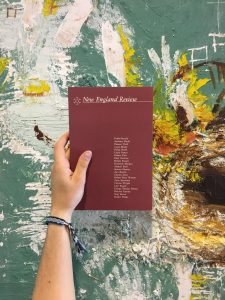
Founding Editor Jay Parini remembers “An Interview with Robert Penn Warren and Eleanor Clark,” from NER 1.1 (1978).
One of my fondest memories dates to the summer day when I traveled with Sydney Lea and Robin Barone to visit Robert Penn Warren and Eleanor Clark in West Wardsboro, a tiny Vermont town on the backside of Mount Stratton. The point of the journey was to interview Warren and Clark for an upcoming issue of New England Review. It was a dazzling sunny day, and we followed the complicated instructions, with the usual rural address that was without numbers or, as far as we could tell, even streets. We found their isolated house in the middle of the woods, near a deep pond. And we sat for hours on their screened-in porch and talked about everything from literature to politics. They were both such vivid talkers, and we had masses of good material to edit down. Warren was Kentucky-born and bred, and his accent remained thick, even after decades in New England. Clark, his wife of many years, was a sharp, ironic Yankee. Their combined intellectual firepower was impressive, and the resulting interview was, I think, a high point for the magazine in its earliest incarnation. I still take it from the shelf and reread it, almost four decades on.
“An Interview with Robert Penn Warren and Eleanor Clark“
**
 Jay Parini founded New England Review in 1978, with Sydney Lea. He was Editor through volume 1 and then Advisory Editor through volume 4. He is Axinn Professor of English and American Literatures at Middlebury College, and has published numerous novels, biographies, and collections of poems. His novels include The Passages of H. M. (2011), Benjamin’s Crossing (1997), and The Last Station (1990), and his biographies include Robert Frost: A Life (2000) and Empire of Self: A Life of Gore Vidal (2011). He has published numerous other nonfiction books, and his New and Collected Poemswas released in 2015. His reflections on meeting Jorge Luis Borges in Scotland, “A Beer with Borges,” appears in NER 39.1 (2018).
Jay Parini founded New England Review in 1978, with Sydney Lea. He was Editor through volume 1 and then Advisory Editor through volume 4. He is Axinn Professor of English and American Literatures at Middlebury College, and has published numerous novels, biographies, and collections of poems. His novels include The Passages of H. M. (2011), Benjamin’s Crossing (1997), and The Last Station (1990), and his biographies include Robert Frost: A Life (2000) and Empire of Self: A Life of Gore Vidal (2011). He has published numerous other nonfiction books, and his New and Collected Poemswas released in 2015. His reflections on meeting Jorge Luis Borges in Scotland, “A Beer with Borges,” appears in NER 39.1 (2018).